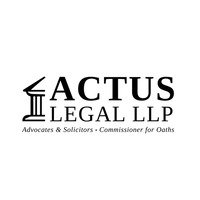Best Due Diligence Lawyers in Chinatown
Share your needs with us, get contacted by law firms.
Free. Takes 2 min.
List of the best lawyers in Chinatown, Singapore
About Due Diligence Law in Chinatown, Singapore
Due Diligence in Chinatown, Singapore, carries significant importance due to its bustling business environment and rich cultural heritage. Due diligence refers to the comprehensive appraisal of a business or investment opportunity to evaluate its commercial potential and verify all material facts. This process is crucial in minimizing risks and ensuring compliance with the legal and regulatory framework specific to Singapore. In Chinatown, where traditional businesses mix with modern enterprises, understanding the local corporate landscape is crucial for thorough due diligence.
Why You May Need a Lawyer
There are several scenarios where you might require legal assistance in conducting due diligence in Chinatown, Singapore:
- **Business Acquisition:** When acquiring a business, conducting detailed due diligence can uncover essential information about liabilities, litigation risks, and financial health.
- **Property Transactions:** Legal advice is vital to ensure compliance with local zoning laws and to identify any encumbrances on commercial or residential properties.
- **Investment Analysis:** Investors seek legal expertise to assess risks, validate financial documents, and evaluate compliance with regulatory obligations.
- **Partnership Agreements:** Due Diligence is needed to verify the credibility and background of potential business partners or co-investors.
Local Laws Overview
Conducting due diligence in Chinatown involves a keen understanding of Singapore's legal landscape. Key laws include:
- **Companies Act:** Governs the legal framework for companies operating in Singapore, crucial for corporate due diligence.
- **Property Law:** Matters related to real estate transactions require understanding of the Land Titles Act and relevant conveyancing practices.
- **Financial Regulations:** Compliance with monetary authorities, such as MAS (Monetary Authority of Singapore), is needed for financial due diligence.
- **Data Protection Act:** Ensuring business practices align with the Personal Data Protection Act (PDPA) is essential for data-related due diligence.
Frequently Asked Questions
What is the primary goal of due diligence?
The goal is to assess and verify information about a business, investment, or asset to mitigate risks and ensure informed decision-making.
Is due diligence mandatory for all business transactions in Chinatown?
While not legally mandatory, due diligence is highly advisable for most transactions to minimize risks and confirm regulatory compliance.
How long does a due diligence process typically take?
The duration varies depending on the complexity and scope of the transaction, ranging from a few weeks to several months.
Can I perform due diligence on my own?
While possible, it is recommended to seek professional legal advice to ensure thoroughness and expertise, particularly in complex cases.
What are the potential consequences of inadequate due diligence?
Inadequate due diligence can lead to financial losses, legal liabilities, and reputational damage if undisclosed issues surface post-transaction.
What records are reviewed during due diligence?
Financial statements, legal records, contracts, employee details, and business operations documents are typically examined.
How does cultural knowledge impact due diligence in Chinatown?
Understanding local customs and business practices is crucial for effective negotiations and revealing potential business risks in Chinatown.
Do small businesses need to conduct due diligence too?
Yes, due diligence is vital for businesses of all sizes to ensure they are making informed and legally sound decisions.
What costs are associated with due diligence?
Costs vary widely based on scope and complexity but typically include legal fees, expert consultations, and administrative expenses.
Who generally conducts a due diligence review?
Due diligence is usually conducted by a team of legal advisors, accountants, and industry experts who provide a detailed analysis of the transaction.
Additional Resources
Consider consulting the following resources for assistance with due diligence:
- **Singapore Academy of Law:** Offers resources and directories for legal practitioners specialized in due diligence.
- **Enterprise Singapore:** Provides insights for businesses on compliance and regulations necessary during due diligence.
- **Monetary Authority of Singapore (MAS):** For guidance on financial regulations crucial for financial due diligence.
- **Law Society of Singapore:** Can help connect you with qualified lawyers experienced in due diligence.
Next Steps
If you need legal assistance in due diligence, consider the following steps:
1. **Identify Your Needs:** Clearly define the scope and goals of your due diligence process.
2. **Select a Lawyer:** Choose a lawyer or a legal firm with expertise in the specific areas where you need assistance.
3. **Arrange Consultations:** Schedule meetings with potential lawyers to discuss their approach and experience.
4. **Gather Documentation:** Compile all necessary documents and information relevant to the due diligence process.
5. **Legal Engagement:** Agree on terms and timelines with your chosen legal representative to commence the due diligence process.
Lawzana helps you find the best lawyers and law firms in Chinatown through a curated and pre-screened list of qualified legal professionals. Our platform offers rankings and detailed profiles of attorneys and law firms, allowing you to compare based on practice areas, including Due Diligence, experience, and client feedback.
Each profile includes a description of the firm's areas of practice, client reviews, team members and partners, year of establishment, spoken languages, office locations, contact information, social media presence, and any published articles or resources. Most firms on our platform speak English and are experienced in both local and international legal matters.
Get a quote from top-rated law firms in Chinatown, Singapore — quickly, securely, and without unnecessary hassle.
Disclaimer:
The information provided on this page is for general informational purposes only and does not constitute legal advice. While we strive to ensure the accuracy and relevance of the content, legal information may change over time, and interpretations of the law can vary. You should always consult with a qualified legal professional for advice specific to your situation.
We disclaim all liability for actions taken or not taken based on the content of this page. If you believe any information is incorrect or outdated, please contact us, and we will review and update it where appropriate.









